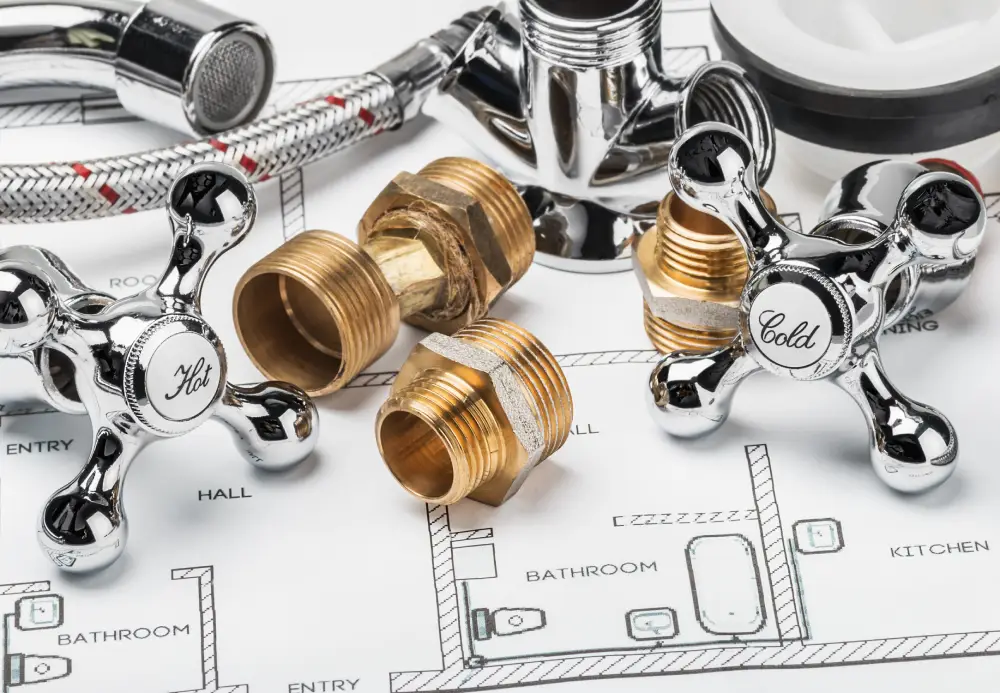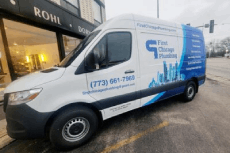Overview
Table of Contents
Maintaining Your Home’s Plumbing System
Maintaining your home’s plumbing system isn’t just about avoiding costly repairs – it’s about ensuring efficient water usage and conservation. Regular inspections can help you catch leaks or corrosion early, while low-flow fixtures minimize water waste.
Fixing dripping faucets and using enzyme cleaners for your drains prevent clogs and conserve resources. Monitoring water pressure is equally essential to protect your pipes. Curious about the steps to take for a smoothly running plumbing system? Follow us in the next section and learn more.
Key Takeaways
- Conduct regular plumbing inspections to detect leaks or corrosion early.
- Install low-flow fixtures to conserve water and reduce utility bills.
- Use enzyme cleaners routinely to prevent drain clogs and buildup.
- Fix leaking faucets promptly to minimize water waste and costs.
- Monitor and maintain optimal water pressure for pipe longevity.
Main Parts of Your Home’s Plumbing System
A home’s plumbing system is a complex network, comprising several essential components that guarantee the smooth delivery and removal of water. At the heart of this system is the main water service line, which channels fresh water from the municipal supply into your home.
From there, the water is distributed via supply pipes to various fixture types, including sinks, toilets, showers, and bathtubs, each specifically designed to fulfill unique needs. Each fixture must be compatible with municipal water pressure to function effectively without leaks or failures.
Additionally, the hot water system branches from the main line, connecting to water heaters that guarantee a steady supply of heated water to your fixtures. Understanding these elements is vital for maintaining an efficient plumbing system.
Common Plumbing Problems in Homes
One of the most common plumbing issues homeowners face is clogged drains, often caused by the accumulation of hair, soap residue, and other debris. Effective drain maintenance is essential to prevent major blockages.
Regularly use enzyme cleaners or a non-caustic drain snake to keep pipes clear. Leaking faucets, usually due to worn washers or gaskets, can escalate water bills if ignored. Quick faucet repairs, by replacing faulty components, can prevent further water wastage. Running toilets, another frequent issue, often result from defective flush valves or misaligned tank components. Address these promptly to conserve water. Finally, low water pressure generally indicates significant limescale buildup within supply pipes. Regular pipe inspections and cleaning can guarantee ideal water flow throughout your home.
How to Maintain a Healthy Plumbing System in Your Home
Maintaining a healthy plumbing system in your home involves more than just reacting to problems as they arise-it requires a proactive, preventative approach that combines regular maintenance, smart habits, and early detection of issues. Here are some essential strategies to help you keep your plumbing system in excellent working condition.
№1. Schedule Routine Plumbing Inspections
One of the most effective ways to avoid unexpected plumbing problems is by scheduling regular inspections – ideally once or twice a year.
These checks can be performed by a professional plumber or as a DIY task if you know what to look for. Pay close attention to signs of corrosion, small leaks, dripping faucets, and water stains on walls or ceilings. Catching these early can prevent costly repairs down the line.
№2. Conserve Water with Smart Fixtures and Habits
Water conservation is not only environmentally responsible but also essential for maintaining plumbing health. Install water-efficient fixtures such as low-flow showerheads, faucets, and dual-flush toilets.
These devices reduce the amount of water flowing through your pipes, which minimizes wear and tear over time. Also, never ignore a dripping faucet or running toilet-these small issues can waste hundreds of gallons of water each month and may indicate underlying problems that require attention.
№3. Keep Drains Clean and Clear
To prevent clogs and maintain proper drainage, clean your drains on a regular basis using safe, natural methods such as enzyme-based cleaners. These are non-corrosive and help break down organic material without damaging your pipes.
Avoid chemical drain cleaners as they can weaken pipe materials over time. Additionally, use drain strainers in sinks and tubs to catch hair, food particles, and debris before they enter your plumbing system.
№4. Monitor Water Pressure Levels
Excessively high water pressure can stress your plumbing system and lead to leaks or pipe bursts. Use a simple water pressure gauge (available at most hardware stores) to measure your home’s pressure.
Ideally, it should be between 40 and 60 psi (pounds per square inch). If it consistently reads higher, consider installing a pressure-reducing valve to protect your pipes and appliances.
№5. Be Mindful of What You Flush or Pour Down the Drain
Your plumbing system isn’t designed to handle everything. Avoid flushing anything other than human waste and toilet paper-even products labeled “flushable” can clog pipes over time. In the kitchen, never pour grease, oil, or food scraps down the sink, as these can solidify and cause stubborn blockages. Use a compost bin for organic waste and dispose of grease in a container instead.
№6. Prepare for Seasonal Changes
Different seasons place different demands on your plumbing. In colder months, insulate exposed pipes, especially those in basements, attics, or exterior walls – to prevent freezing and bursting. In warmer months, check outdoor faucets and irrigation systems for leaks or damage before heavy use.
By combining regular maintenance with mindful usage, you can extend the life of your plumbing system, avoid costly emergencies, and ensure consistent performance throughout your home. Taking these preventative steps not only protects your property but also gives you peace of mind knowing your home’s infrastructure is in good shape.
Benefits of Utilizing Excellent Plumbing ServicesWhile maintaining a healthy plumbing system through regular inspections and mindful usage is vital, leveraging the expertise of professional plumbing services can further improve your home’s plumbing health. Expert plumbers like First Chicago Plumbing can provide swift problem resolution, guaranteeing minimal downtime and peak functionality.
With their professional help, you can address urgent issues promptly, preventing costly water damage. They guarantee customer satisfaction through precise diagnostics and effective solutions, backed by warranties for peace of mind.
Their proficiency translates into significant cost savings, as professional-grade repairs reduce the frequency of recurring issues.
Furthermore, upgrading your plumbing with skilled workmanship not only boosts system efficiency but also enhances your property value, appealing to potential buyers by eliminating common plumbing concerns.
Final Thoughts
You’ve tackled a monumental task by diving into your home’s plumbing system! By keeping an eagle eye on leaks and corrosion, you’re not just saving pennies-you’re saving a fortune!
Fix those dripping faucets, and you’ll feel like you’ve conquered Niagara Falls! With regular drain cleaning and pressure monitoring, you’re not just maintaining a system – you’re orchestrating a plumbing symphony of efficiency and longevity.
Frequently Asked Questions
What Are the Signs of a Hidden Plumbing Leak?
You’ll notice signs of hidden plumbing leaks through unexplained water bills, damp spots, or mold. Utilize leak detection tools and moisture inspection techniques to identify leaks early, preventing structural damage and costly repairs. Regular checks are essential.
How Can I Improve Water Efficiency in My Home?
To improve water efficiency in your home, install water-saving fixtures like low-flow showerheads and dual-flush toilets. Optimize irrigation systems by using drip irrigation and smart controllers, ensuring precise water delivery and minimizing waste.
What Should I Do if My Water Bills Suddenly Increase?
If your water bills skyrocket overnight, imagine your wallet hemorrhaging cash. Investigate excessive water usage by checking for leaks. Inspect faucets, toilets, and pipes. Install a leak detection system for real-time monitoring and swift problem-solving.




